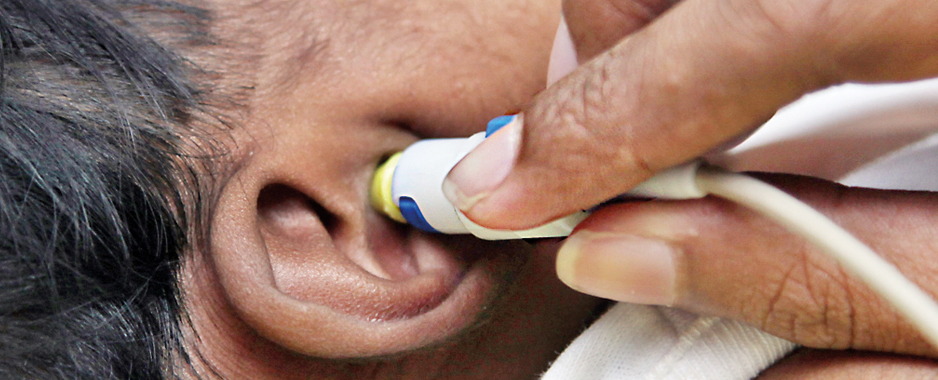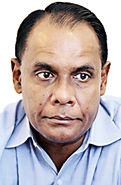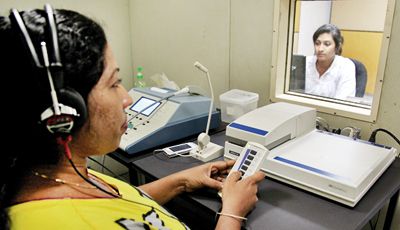Complete hearing care at the Ratmalana Audiology Centre
Mothers cradle their infants as they await their turn to be called in for the hearing screen test. In another room a woman watches eagerly as hearing aids are prepared for her. It is yet another busy day at the Ratmalana Audiology Centre.
Spotlessly clean and set in a serene environment, this centre is a haven of hope in the midst of all the hustle and bustle of the busy town.

Set up by Dialog Telekom PLC in 2007 as part of their Corporate Responsibility initiatives to conduct hearing tests free of charge for the students at the Ceylon School for the Deaf and Blind, the centre now charges for the services it provides to the general public to sustain its operations.
Fitted with sound-proof rooms and modern technological equipment, the centre conducts hearing tests, fits hearing aids and offers speech therapy. “Our aim is to reduce the number of deaf people in Sri Lanka,” said Manager, Amal Rodrigo.
Hearing tests for adults and children are conducted in order to ascertain their hearing level and if a loss of hearing is detected, appropriate solutions are recommended. The hearing test costs Rs. 1,500 while the Neonatal Hearing Screen Test, which is a diagnostic test, with a detailed report, costs Rs. 1,450.
“We want to create awareness regarding the Neonatal Hearing Screen Test amongst parents,” said Mr. Rodrigo. He explained that while in many other countries this test is usually carried out before the new-born babies are taken home, that is not the case in Sri Lanka.
“It is important that this test is taken before the infant is a month old and a solution sought within six months,” said Audiologist and Speech Therapist, Kasuni Rodrigo who explained that as the development of the child is faster in the early years, detecting the problem and finding a solution as soon as possible would mean a higher probability of achieving a near normal condition for the child.
 Amal Rodrigo |
 Kasuri Rodrigo |
“The window of opportunity gets narrower as the child grows older,” added Mr. Rodrigo, emphasising the importance of this test.
He went on to say that most parents are wary of the test and often ask if sedatives need to be administered before the test is taken. “However, there is no need to administer sedatives, the test is not painful and it takes only about five minutes,” assured Mr. Rodrigo.
When the test is conducted, the results are indicated on the screen of the testing device as either ‘pass’ or ‘refer’. If the screen displays ‘refer’ the test is repeated in two weeks. If the result remains the same, the child is referred to an ENT specialist.
This is due to the fact that the hearing deficiency might sometimes be remedied by measures such as cleaning the ear wax. However, if the hearing loss continues and a solution is yet not arrived at, it is then that the child will be asked to go in for a detailed test known as the Auditory Brainstem Response Audiometry test.
“This process would take about six months. Therefore, the sooner the child is tested the better,” said Kasuni.
Most of the time parents refuse to accept the fact that their children have a hearing problem, and when they finally do face the facts, they visit several doctors wanting to verify if the child actually does have a hearing problem. This results in a loss of precious time.
“Therefore, if there are risk indicators such as a history of bad hearing in the family or Down Syndrome a hearing test should be done,” advised Kasuni.

Speaking about the fitting of hearing aids, Mr. Rodrigo explained that hearing aids could either be analogue or digital. While the analogue hearing aids are cheaper, they amplify all the sounds and can cause discomfort to the user. On the other hand, the digital aids can be customised to suit each person’s needs and can also be changed as the person’s condition changes.
“A person can’t just pick any hearing aid,” said Mr. Rodrigo, adding that there are custom made hearing aids to fit each person as per their need and size.
The centre also offers special education to children with Down Syndrome, Autism and learning disabilities. “Emphasis is laid on developing their motor skills, and helping them to carry out their daily activities, such as eating on their own, using a pen and toilet training” explained Kasuni adding that they strive to improve their quality of life.
The centre also conducts hearing tests at corporate events and schools. The Ratmalana Audiology Centre is situated at 15, Borupana Road, Ratmalana.
Follow @timesonlinelk
comments powered by Disqus
























